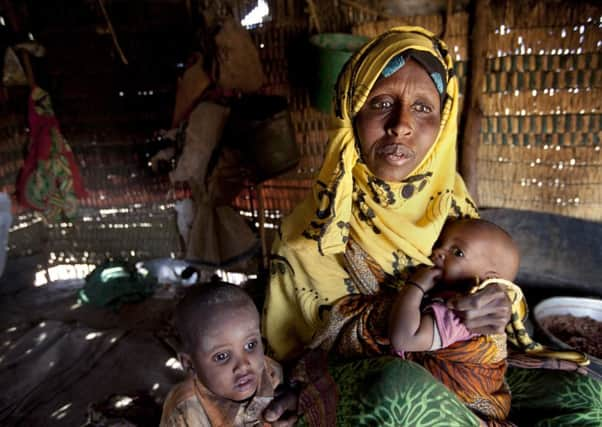Jamie Livingstone: Ethiopia facing food crisis once again
This article contains affiliate links. We may earn a small commission on items purchased through this article, but that does not affect our editorial judgement.


It is more than 30 years since horrifying images of famine in Ethiopia sparked an enormous humanitarian response. Since then, Ethiopia has changed enormously but today millions of people are again at crisis point.
A devastating drought – one exacerbated by the climate phenomenon known as El Niño – has caused the worst food crisis to hit the country since that of 1984.
Advertisement
Hide AdAdvertisement
Hide AdMillions of people are at risk of hunger and disease. Many crops have failed, water sources are drying up and livestock are dying – pushing the poorest people even further into poverty.
The number of women, men and children in urgent need of food and clean, safe water is rising rapidly.
Mum of seven Habodo Gele, 35, lives in a small settlement called Bisle in Siti region after being forced to leave her home in search of water – only one of her 60 cows has survived.
“Until now, the drought has mainly affected animals,” she told us. “Today it is affecting humans. It is scary. We don’t have enough food. We are just trying to survive.”
Almost eight million people will receive help from the Ethiopian government-led safety-net programme.
While welcome, funding is urgently needed to reach a further 10.2 million people.
Oxfam believes in a world without poverty – one in which no-one goes hungry.
We’ve been working in Ethiopia since the 1960s and responding to the current crisis since May 2015.
Advertisement
Hide AdAdvertisement
Hide AdWe’re helping more than 160,000 people in three of the worst affected regions – Somali, Afar and Oromia – by trucking in water, repairing boreholes and wells, and by supplying animal feed.
The provision of clean, safe water during a food crisis is vital for drinking, cooking and hygiene.
People suffering from malnutrition, children in particular, are weaker and therefore at much greater risk of waterborne diseases and diseases linked to poor hygiene – such as scabies, which is already spreading.
We are supporting people to ensure they can recover quickly once the crisis has passed.
In the Afar region, we are working with a local partner organisation to install reservoirs.
Ethiopia is among a number of countries struggling with the effects of one of the strongest El Niños on record.
El Niño is a natural phenomenon that occurs periodically; although it is not directly caused by climate change, global warming makes it more likely that strong El Niños will develop.
Along with food shortages in southern Africa, Papua New Guinea and Central America, it has also caused floods in Paraguay and Bolivia.
Advertisement
Hide AdAdvertisement
Hide AdTens of millions of people around the world are being affected, with crops failing in many countries and poor people, as always, being hit hardest despite having done least to cause climate change.
The impact is adding further strain to a humanitarian system that is already struggling to cope with the dire human impact of the war in Syria and the forgotten crisis in Yemen.
Over the past year, Oxfam has had no option but to ask the public to support our work.
Alongside public generosity, the crisis in Ethiopia further underlines the need for the Scottish Parliament to play its part in providing support to the world’s poorest people by building on our already proud record. That includes doing more to realise the ambition of our world-leading targets to reduce our climate emissions; we have made progress, but continue to miss our annual targets.
But it also means protecting, despite domestic financial pressures, the value of the financial support we commit to those in need beyond Scotland.
Scotland’s recent commitment to increase the value of the Climate Justice Fund is therefore hugely welcome and recognises our historic and indeed ongoing role in causing climate change.
But this enhanced contribution must now be matched in two other key areas.
Firstly, over the last six years Scotland’s International Development Fund has been frozen in cash terms at £9 million. This freeze means the value of the fund has fallen in real-terms by more than 8 per cent.
Advertisement
Hide AdAdvertisement
Hide AdAll parties must commit to restoring the fund and to maintaining it in real-terms value.
But we must also enhance our response when emergency does strike, as it too often does.
Ahead of the Scottish election in May, we have outlined how the Scottish Parliament can deepen its contribution to tackle inequality at home and abroad, in order to reduce poverty.
In the last Parliament, with welcome cross-party support, the Scottish Government provided funding for emergencies in east Africa, Gaza, Syria, the Philippines and Nepal.
However, the number of people affected by humanitarian crises has almost doubled over the past decade and it is expected to keep on rising. Global humanitarian spending is increasing, but need is rising even faster.
We must now make Scotland’s support more predictable and transparent, and ensure it gets to where it is needed as fast as possible, by establishing a new “International Emergency Fund”.
Scotland’s contribution will always be relatively small when compared to the enormous level of need, but at a time of such growing humanitarian suffering, we all need to dig deep.
• Jamie Livingstone is head of Oxfam Scotland. To donate to Oxfam’s work in Ethiopia go to: https://donate.oxfam.org.uk/ethiopia